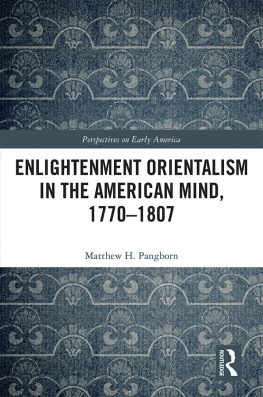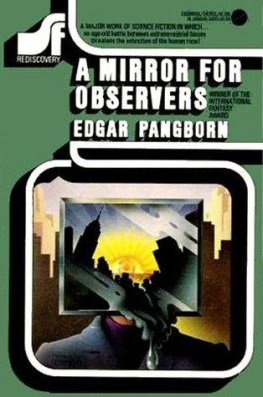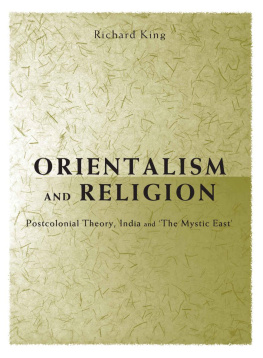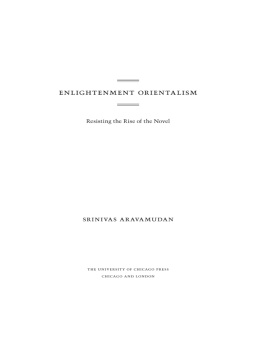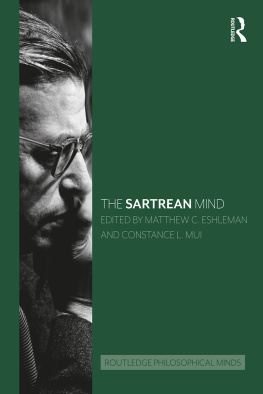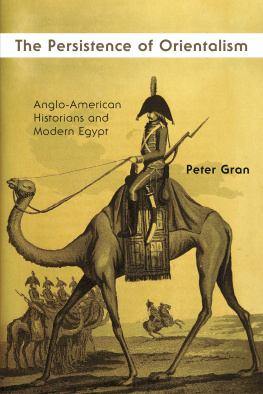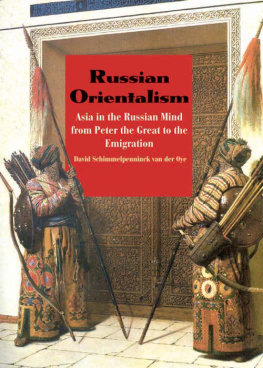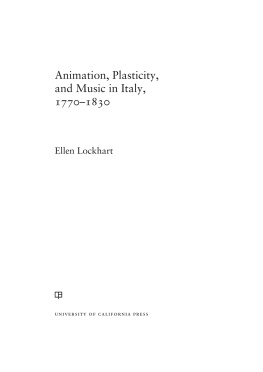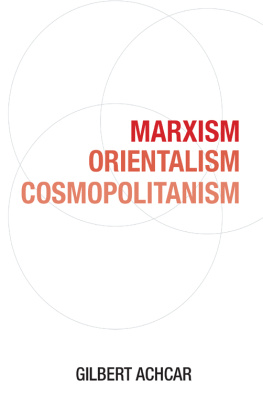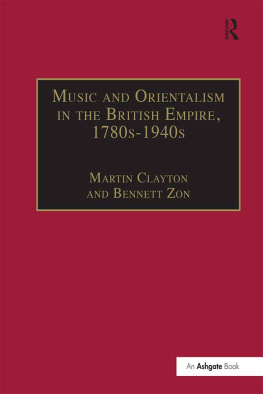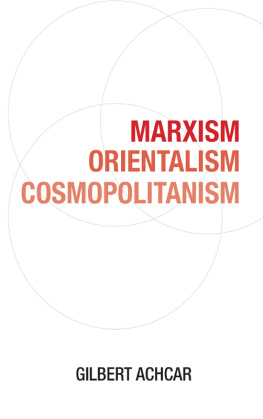Enlightenment Orientalism in the American Mind, 17701807
This study engages with the emerging field of energy humanities to provide close readings of several early American oriental-observer tales. The popular genre of orientalism offered Americans a means to critique new ideas of identity, history, and nationality accompanying proto-industrialization and a growing consumerism. The tales thus express a complex self-reflection during a time when Americas exploitation of its energy resources and its engagement in a Franco-British world-system was transforming the daily life of its citizens. The genre of the oriental observer, this study argues, offers intriguing glimpses of a nation becoming strange in the eyes of its own inhabitants.
Matthew H. Pangborn is Associate Professor of English at Briar Cliff University in Sioux City, Iowa.
Perspectives on Early America
Series Editors: Craig Friend (North Carolina State University, USA) and Stacey Robertson (SUNY Geneseo)
1 Quakers and Their Allies in the Abolitionist Cause, 17541808
Edited by Maurice Jackson and Susan Kozel
2 Enlightenment Orientalism in the American Mind, 17701807
Matthew H. Pangborn
For more information about this series, please visit: https://www.routledge.com/Perspectives-on-Early-America/book-series/PEA
First published 2019
by Routledge
711 Third Avenue, New York, NY 10017
and by Routledge
2 Park Square, Milton Park, Abingdon, Oxon OX14 4RN
Routledge is an imprint of the Taylor & Francis Group, an informa business
2019 Taylor & Francis
The right of Matthew H. Pangborn to be identified as author of this work has been asserted in accordance with sections 77 and 78 of the Copyright, Designs and Patents Act 1988.
All rights reserved. No part of this book may be reprinted or reproduced or utilised in any form or by any electronic, mechanical, or other means, now known or hereafter invented, including photocopying and recording, or in any information storage or retrieval system, without permission in writing from the publishers.
Trademark notice: Product or corporate names may be trademarks or registered trademarks, and are used only for identification and explanation without intent to infringe.
Library of Congress Cataloging-in-Publication Data
A catalog record for this book has been requested
ISBN: 978-1-138-35867-6 (hbk)
ISBN: 978-0-429-43422-8 (ebk)
Typeset in Sabon
by codeMantra
For all of my teachers, beginning with my first teacher, my mother
I would like to begin by thanking the first readers of this material, Rick Barney, Jennifer Greiman, and Branka Arsic, for their encouragement and guidance, as well as the last readers before publication, the anonymous reviewers at Pickering and Chatto, for their suggestions. In between, Ron Bosco and Jeff Berman provided vital support and mentorship. Adam W. Sweeting and the anonymous readers for the special issue of Humanities on Energy Use and the Humanities were instrumental in helping me work out my thinking in this direction. I am grateful as well to Jacob Rama Berman for his kind and insightful comments at the American and Muslim Worlds ca. 15001900 conference at the University of Pennsylvania McNeil Center for Early American Studies in 2017, and Bill Hunt at the same conference for a wonderful conversation about Father Bombos Pilgrimage to Mecca and Bombo rum. Maria OMalley also provided generous readings of an early version of a chapter. I would like to thank as well audience members at presentations to various conferences for their feedback and questions, including C19: the Society of Nineteenth-Century Americanists, the Society of Early Americanists, the American Society for Eighteenth-Century Studies, the Association for the Study of Literature and the Environment, the Society for Interdisciplinary Nineteenth-Century Studies, and the Group for Early Modern Cultural Studies.
For help with research materials, I am greatly indebted to Julius Fleschner and Sister Mary Jane Koenigs at Briar Cliff Universitys Bishop Mueller Library. This project could not have been completed without their invaluable resourcefulness and dedication. BCU student Claire Dufur very cheerfully and creatively assisted in organizing my notes.
Closest to home, I am deeply grateful to Alexis for her love and support, and to Aubrey and Julian, who not only crafted a beautiful Do Not Deserb sign to respect their fathers necessarily long hours in his study but also often wisely ignored their own handiwork, to provide me with time even more essential.
The Arabian proverb says, A fig-tree, looking on a fig-tree, becometh fruitful.
Ralph Waldo Emerson, The American Scholar (1837)
I will begin with the word orientalism. To the general reader, who in an unfortunate time of increasing xenophobia will rightly find suspicious such a generalizing label for a rich diversity of cultures, the word will conjure up hate, blindness, and intolerance. For the literary critic, well versed in the arguments of Edward Saids seminal 1978 study of the same name, the term will evoke a nineteenth-century discourse speciously rationalizing Western aggression against the East as some kind of civilizing mission. In my title, the word refers to neither.
Eighteenth-century Americans felt a great respect for Eastern cultures, one of which, they were all too aware, had produced the Bible. Moreover, Americans of the time had little reason to feel themselves superior to cultures whose wealth, longevity, and established national character represented nearly everything to which they anxiously aspired. While this attitude would change at the beginning of the nineteenth century, Americans in the period covered by this study were cognizant the mysterious East was actually made up of different peoples. In fact, they demonstrated curiosity about those other peoples cultures. >From time to time, specific American travelers or traders made contact and established rich cross-cultural understandings. But, yet again, these contacts and exchanges are not the subject of this study.
If I keep the term orientalism in my title, and focus on the period Americans use of this imaginative category and not on a few outliers actual exchanges with people from other countries, it is because this category, as an imaginative field of conceptualization and not as an ethnographic mistake or imperialist projection, did important work for the people who used it. Indeed, while what the categorys users meant by orientalism tells us very little about other people in the world, it tells us a great deal about the categorys users. What it tells us, I will argue, is how Americans adapted themselves to fundamentally transformative changes that forever altered their conception of themselves and their place in the world. Getting at that meaning, however, requires that we set to the side our own notions of nation, identity, history, and race to consider the very different ways in which the period under focus here conceived of them. If we want to know how the oriental tale functioned during that past time, in other words, we have to know how that past era constructed the category.
For the overwhelming majority of Americans during the period, there appeared in the general direction of the East qualities apart from specific regional characteristics. The East was a place of luxury, sensuality, deep history, wisdom, poetry, and violence. As Americans embarked on a path of proto-industrialization that brought them material wealth, new practices of self, wars, and increasing uncertainty, they found this concept useful for charting and questioning their own course as a people. My argument is that at the heart of this period of American fascination with the imaginative category of the orient is an attempt to understand this change, using much the same framing as what Kenneth Pomeranz calls the Great Divergence. In this present study, we will see Americans use this concept of a declining East, and the genre of orientalism, to explore their own enrichment and advancement by way of the exploitation of natural resources on a scale hitherto unseen in human history. And if the Eastern figure appeared in their imaginings as a way of representing a level of resource consumption with which they had very little prior experience, it was a characterization that changed dramatically as soon as America began to catch up to the possibilities imagined for it. When the U.S. began to ascend to the global stage, in other words, the East was abruptly pushed aside in the American mind. No longer the companion vision of a possible American future, the East of abstract dreaming became tethered instead to an actual place on which America might demonstrate the realization of its own higher destiny.

